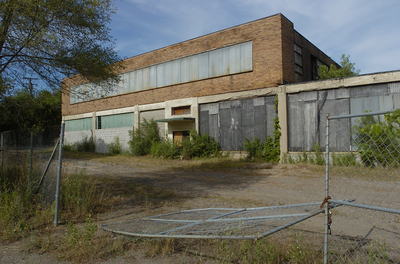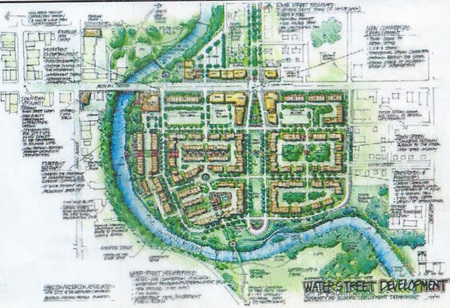Ypsilanti's Water Street: Is Family Dollar plan a new start after 14 years of waiting?

Ypsilanti Mayor Paul Schreiber takes a turn smashing a concrete wall during the ceremony to kick off Water St. property clean-up project in Ypsilanti, Mich. on May 3, 2010. AnnArbor.com file photo
-
Ypsilanti Mayor Paul Schreiber takes a turn smashing a concrete wall during the ceremony to kick off Water St. property clean-up project in Ypsilanti, Mich. on May 3, 2010. AnnArbor.com file photo /calendar/photologue/photos/cache/050310-AJC-water-street-cle_fullsize.JPG
-
A crane knocks down a wall during the ceremony to kick off Water St. property clean-up project in Ypsilanti, Mich. on May 3, 2010. AnnArbor.com file photo /calendar/photologue/photos/cache/050310-AJC-water-street-cle-2_fullsize.JPG
-
Water Street Redevelopment Project Manager John D'Addona speaks during the ceremony to kick off Water Street property clean-up project in Ypsilanti, Mich. on May 3, 2010. AnnArbor.com file photo /calendar/photologue/photos/cache/050310-AJC-water-street-cle-3_fullsize.JPG
-
The 38-acre Water Street site in Ypsilanti, pictured here on Friday, May 3, has been vacant for nearly 14 years. Daniel Brenner I AnnArbor.com /calendar/photologue/photos/_Water Rd/cache/05032013_BIZ_WaterRd_DJB_0005_fullsize.JPG
-
A portion of the Water Street property has frontage on Michigan Avenue. Daniel Brenner I AnnArbor.com /calendar/photologue/photos/_Water Rd/cache/05032013_BIZ_WaterRd_DJB_0038_fullsize.JPG
-
The Water Street site, pictured here on Friday, May 3, is the largest piece of vacant land owned by the city of Ypsilanti. Daniel Brenner I AnnArbor.com /calendar/photologue/photos/_Water Rd/cache/05032013_BIZ_WaterRd_DJB_0048_fullsize.JPG
-
Grass has now grown over land that once occupied several businesses and a few residences on Water Street. Daniel Brenner I AnnArbor.com /calendar/photologue/photos/_Water Rd/cache/05032013_BIZ_WaterRd_DJB_0052_fullsize.JPG
-
The Huron River, pictured here on Friday, May 3, runs along the Water Street property. Daniel Brenner I AnnArbor.com /calendar/photologue/photos/_Water Rd/cache/05032013_BIZ_WaterRd_DJB_0064_fullsize.JPG
-
Ypsilanti resident Frank Jr. fishes in a river near Water Street in Ypsilanti on Friday, May 3. Daniel Brenner I AnnArbor.com /calendar/photologue/photos/_Water Rd/cache/05032013_BIZ_WaterRd_DJB_0076_fullsize.JPG
-
A plot of land for sale near Water Street in Ypsilanti on Friday, May 3. Daniel Brenner I AnnArbor.com /calendar/photologue/photos/_Water Rd/cache/05032013_BIZ_WaterRd_DJB_0085_fullsize.JPG
-
The Huron River near Water Street in Ypsilanti on Friday, May 3. Daniel Brenner I AnnArbor.com /calendar/photologue/photos/_Water Rd/cache/05032013_BIZ_WaterRd_DJB_0095_fullsize.JPG
-
The Huron River, pictured here in Ypsilanti on Friday, May 3, is an asset that runs along Water Street, according to city officials. Daniel Brenner I AnnArbor.com /calendar/photologue/photos/_Water Rd/cache/05032013_BIZ_WaterRd_DJB_0119_fullsize.JPG
-
Ypsilanti resident Frank Jr. fishes in a river near Water Street in Ypsilanti on Friday, May 3. Daniel Brenner I AnnArbor.com /calendar/photologue/photos/_Water Rd/cache/05032013_BIZ_WaterRd_DJB_0123_fullsize.JPG
- Related column: Ypsilanti's Water Street: Contradictions keep city from fulfilling any potential for property
If the $1.2 million Family Dollar project proposed for the Water Street property in Ypsilanti goes forward, it will be the first development there since the city began began assembling the 38-acre site in 1999 with a vision to turn it into a premier waterfront residential and retail hub for its residents.
Compared to the grand plan for Water Street that originally included condominiums, restaurants, a waterfront park and bike paths, the proposal for the store is a decidedly modest one.
But, nearly 14 years after the city embarked on the Water Street plan, redevelopment of the property has been slow to happen after two developers backed out of proposed projects, leaving behind mounting debt and rising uncertainty among residents.
City leaders have said Family Dollar, despite some residents' preference for an independent retail establishment, rather than a chain, fits in with the original retail development plan for Water Street. Critics have accused the city of adopting a "beggar's mentality" to get development on the site.
The City Council is poised to decide Tuesday night whether to give the Family Dollar plan the green light.
Core Resources, LLC, the development partner with Family Dollar, will purchase nearly one acre of land for $210,000 to construct a store of approximately 8,320-square-foot at Park and Michigan Avenue.
Officials have estimated that Family Dollar will pay about $30,000 in taxes annually that would go toward paying down the debt incurred thus far for the property.
Updated numbers provided by Ypsilanti's Fiscal Director Marilou Uy show that as of May 3, the city owes $24,764,695 on the Water Street debt, a decrease from 2006 when the city owed close to $30 million.
To date, the city has paid $4.6 million of the debt. The payments, and interest rate, are expected to increase as the city continues to pay through 2031. The debt repayment schedule shows two payments are due each year and the first 2013 payment of $848,783.75 was due May 1 of this year. The next payment, $435,070, is due Nov. 1.
Officials have discussed refinancing the debt in the near future.
So far, the city has used more than $5 million from the general fund to go toward Water Street and has spent $30.2 million, according to records provided by Uy.
A look back at Water Street's history reveals a long and often tumultuous struggle to transform the property. It was a struggle infused with cautious hope as the city looked for ways to propel itself forward amid financial difficulties.
Assembling the property
Before Water Street became vacant, several businesses and a few residential properties were on the site.
"There were some vacant buildings, four houses, only one of which was owner occupied," said City Planner Teresa Gillotti, who became part of the city staff after the site was assembled. "It was kind of a combination of uses."

This undated photo shows one of the former industrial buildings on the Water Street site.
AnnArbor.com file photo
Some of the former businesses included JJ's Car Wash, Walter's Heating and Cooling, Wireless Toyz, Speedy Printing and the Ypsilanti Iron and Metal Works.
In 1990, a group, Ypsilanti 2000, was formed to discuss ways to improve the city and one idea was to potentially redevelop the Water Street site and tear down the vacant buildings in an effort to beautify the city and improve its image.
The city decided to hire Hyett-Palma, a consulting firm, to conduct a study in 1992 to see whether it made sense for the city to assemble the Water Street site as a city-owned property, records show. The study concluded the city should move forward with pursuing the project, predicting it would improve the city's image and also bring in more tax revenue. Records show all of the properties on the site at the time collectively brought in about $40,000 in property taxes annually, and officials believed the Water Street site had the capability to produce much more.
Before the city began to try to acquire the property, it conducted a community charette in October 1999 to get a feel for whether the community was in favor of the idea, Gillotti said.
"They had people comment on what they wanted," Gillotti said. "That was important."
The concept residents agreed they would like to see included single-family units and townhomes or row houses between two and four stories tall.
Residents also said they would like to see 100,000 square feet of commercial mixed use on the site, with a 25,000-square-foot waterfront restaurant or some other form of entertainment. Records show residents also thought the site would be a good place to have a waterfront park, with river access, bike pathways and a boulevard entrance off River Street.

Community members said they would like to see 100,000 square feet of commercial mixed use on the site, with a 25,000-square-foot water front restaurant.
Courtesy City of Ypsilanti
In 2001, the city received a $3.7 million grant from the state to help purchase the land and a $100,000 federal grant from the Environmental Protection Agency to go toward the cleanup of the land. The city also received a $750,000 grant for development from the Michigan Economic Development Corp.
Also in 2001, the city chose Biltmore Properties Corp. of Troy to be the property's developer and clear the buildings south of Michigan Avenue between the Huron River and Park Street.
Three developers had shown interest in the property.
Biltmore's vision was to develop the entire property with 872 condominiums. Biltmore planned to create several distinct neighborhoods within the site, with a "single restaurant pad" and 7 acres for a linear park with public access.
Biltmore planned to develop nearly seven acres along the Huron River in to River's Edge park, to connect Riverside and Waterworks park. The River's Edge park was to include walkways, gardens and an overlook along the river.

Biltmore was chosen to be the first developer of the Water Street property. It's vision was to create 872 condominiums on the entire site.
Courtesy City of Ypsilanti
Officials hoped that the project would lure more than 1,000 potential residents to the city.
During the process of figuring out how to acquire the site, the city conducted several appraisals of the businesses and homes. Some businesses were relocated and in some instances, the city helped them find space elsewhere within the city.
The initial budget for land acquisition was between $6 and $7 million, according to city records. The project plan required raising ground in the floodplain at an additional cost of between $5 and $7 million.
The first six initial demolitions occurred in May 2003, and the second demolition phase of eight buildings on the northwestern part of the property began in early January 2004. The Ann Arbor News reported at the time that the buildings were cleared to make way for the park and condominium developments.
The city paid Transport Inc. of Northville $735,230 to demolish the buildings and to remove and dispose of the contaminated soil, according to the Ann Arbor News. By January 2004, the city had about $6.7 million in state grants to help pay for environmental cleanup.
The city subsequently issued $10.4 million in bonds in 2004 to help cover the cost of the development. The city had hoped to pay the bonds back with taxes generated from the new condominiums.
Legal issues arise
Although the city was able to acquire more than 25 of the original 36 parcels on the property with relatively few issues, some property owners threatened to take the city to court to try to fight the acquisition.
After negotiations failed, city officials condemned the property and filed lawsuits against the owners in 2003 to purchase the land. Condemning the land, at the time, allowed governments and municipalities to take private properties for public use at a "fair price."
The city looked at using eminent domain as a way to acquire the property, saying it would be used for economic redevelopment purposes, Gillotti said. However, the city did not pursue acquisitions through eminent domain.
On Feb. 3, 2004, the City Council approved a resolution offering the payment of "just compensation" for the acquisition of the remaining property located in the Water Street Redevelopment Area in order to pursue the city's Water Street Development Plan.
The resolution allowed former City Manager Ed Koryzno to evaluate and settle, within permissible parameters, all of the claims arising from the acquisitions.

Ed Koryzno
AnnArbor.com file photo
Records show the city approved the settlement of the following cases:
Fagan Enterprises: The city settled pending litigation for $2,166,000, which was the amount stated on the record of the judicial hearing held on Jan. 29 and 30 in 2004.
The city paid this amount for two buildings along East Michigan Avenue and one on River Street. The buildings were owned by Irene Fagan, owner of First Class Supply at 38 E. Michigan Ave.
Plasber Inc., Julius Rim and Dura Corporation: The city settled with Plasber Inc., Julius Rim, and Dura Corporation for $1,295,000. Rim owned a 140,000-square-foot former automotive factory in the middle of the proposed project.
Albert Allen and River Street Investments: The city agreed to settle pending litigation for $750,000 or the construction and purchase of a building at 202 S. River St. that was used to store street salt.
Norfolk Southern, Railroad ROW: The city purchased the Water Street railroad right of way for $115,000. Norfolk used the land for railroad tracks.
Alan Ackerman, lawyer for the owners, told the Ann Arbor News in February 2004 that he believed the land owners should have received more money and that it was a "good deal" for the city."
Pollution and contamination halts project
In September of 2004, the city learned that deep soil contamination from businesses that operated on the site would affect the plans to include condos along Michigan Avenue.
"The chief concern is the cost," Ypsilanti resident James Fink told the Ann Arbor News in 2004. " It's a good project but can the city afford it?"
By 2004, the city had spent about $17 million, $4.7 of which were from grants, on the project. The city estimated at the time that costs would balloon to about $25 million. Yet, once fully developed, the city estimated the property would generate about $3.7 million a year in property tax revenue.
In 2004, the city owed about $27 million in loans for different projects, including the Water Street property and water main replacements, city records show.
At this point, Koryzno still said the city didn't have any plans to use general fund money to help cover the project.
The Ann Arbor News reported that for more than 200 years, the Water Street area was home to several industrial related businesses and the former Ypsilanti Press. In the 1980s, city leaders considered demolishing vacant properties on the site, and that work began in 1998.
Environmental testing revealed that some of the contamination was deeper than predicted. It was determined that some areas along Michigan Avenue were too contaminated for residential use and Biltmore reduced its projected number of living units from 872 to 721.
First developer leaves the project
Al Green, owner of Green Financial Group in Ypsilanti, told the Ann Arbor News that the city was making a risky move by involving taxpayer money in the project. Green said that venture should have been left to private developers, who the city could have helped acquire the land by using eminent domain without risking city funds.
"If the real estate boom turns into a bust, it could send the city into a crisis," Green told the News. " High-risk investment is not the function of government."
Fink told the News he feared the investment wouldn't contribute to the general fund until the debt was paid off.
On Dec. 22, 2004, the city announced it was "dismissing" Biltmore from the project, largely because the two sides couldn't agree on who would pay for cleaning up the contaminated land.
The scope of the project also evolved from a residential development to a commercial one along Michigan Avenue because of the contamination.
Mayor Cheryl Farmer told the Ann Arbor News the clock on the city's debts was ticking and the city couldn't wait "indefinitely" for a developer to move forward.

Former Mayor Cheryl Farmer
AnnArbor.com file photo
In August of 2005, the city announced it would pay Biltmore $725,000 to end its relationship in return for information the developer had amassed over four years, such as architectural and environmental data.
Ypsilanti resident Robert Doyle wrote a letter to council on Nov. 1, 2005, outlining what he believed to be several missteps made by city leaders. Doyle questioned why the budget for the project continued to balloon.
The Ann Arbor News reported on June 28, 2004, that the city's Water Street project costs were $10 million over the original budget, but the city insisted the project was on target and that some unforeseen expenses caused the budget to increase.
The original land acquisition costs were budgeted to be between $6 and $7 million dollars in 2001. Those expenditures increased to nearly $13 million in 2005.
"The city appears reluctant to admit that problems exist, let alone accept responsibility for them," Doyle wrote. "...The glow of optimism is beginning to sound like false hope... . I would actually feel more comfortable about our current situation had only a handful of developers picked up the RFP (request for proposals) and a few submitted letters of interest.
"Instead, we know that at least 15 developers expressed initial interest in the project, evaluated the opportunity and didn't respond as requested. This wasn't just a warning bell, this should be seen as a five-alarm fire with flames licking the night sky."
Doyle cautioned the city to move forward carefully, as the next steps could potentially have an adverse impact on the city.
"Should the unmentionable happen — that Water Street fails — the bonds that have been sold are backed by the full faith and credit of the City," Doyle wrote. "That means that the taxpayers of Ypsilanti have guaranteed those loans, and we will be responsible for paying them off should the development not perform as hoped. State receivership will not wipe this slate clean. We have guaranteed these loans no matter what may be our hardship."
New developer comes in as city officials exit
As the city wrestled with what to do, some officials who had been instrumental in developing the Water Street plan announced plans to leave.
Megan Gibb, the city's planning and development director announced that she would be leaving Feb. 13, 2006, for a job in Portland, Ore., where she still works to this day.
Gibb was the third high-ranking official to leave the city in a matter of months.
Former Police Chief George Basar left and Brett Lenart, the city's former redevelopment coordinator, left early in 2006 as well.
Farmer, the mayor at the time, announced that she didn't plan to run for a fourth term.
Koryzno told the Ann Arbor News that he was concerned about losing experienced employees, who were looking to leave because of the city's mounting financial issues, adding that it was the highest turnover he had seen in the 10 years he worked for the city.
Gibb told the News she took the job because Portland is an "urban planner's dream city."
By the end of April, the city selected a new developer, Joseph Freed and Associates of Illinois.

Joseph Freed and Associates' plan included a mixed use development.
Courtesy City of Ypsilanti
The city also refinanced $13.1 million it borrowed up until that point, allowing it to postpone payments that were due in November of 2006 until 2009. However, the refinance cost the city about $3 million.
The Ann Arbor News reported that five developers expressed interest in the project, but Freed was chosen because it had a reputation for completing projects and was experienced in brownfield, commercial and residential developments.
Freed at the time was working on the Ashley Terrace development in Ann Arbor, as well as on a project in Plymouth. Freed was also the developer of Arborland in Ann Arbor.
Freed envisioned retail space along Michigan Avenue, with parks along the Huron River and residential units on the rest of the site.
By August 2006, the city hired Karen Hart as its new planning and development director with a salary of $73,000 and in November 2006, Ypsilanti elected a new mayor, Paul Schreiber, replacing some of the officials lost throughout the year.
Freed walks away
The city announced on Dec. 8, 2006, that Freed had decided to back out of the Water Street project, citing an uncertain economic future. Freed was slated to sign a development agreement that same month.
In a memo to city council, Koryzno wrote that Freed's decision was based on the state’s poor economy and slow housing market.
"Detroit-area home prices experienced the worst decline of any urban area in the nation between July and September and the state’s current housing market is its worst in 30 years," Koryzno wrote. "Prior to this decision, the city and Freed worked “hand in hand” to negotiate a development agreement."
At this point, the city had about $1.25 million remaining in grants and loans for demolition and environmental cleanup of the property, according to the memo.
Koryzno informed council it had the option of continuing to search for a master developer to take on the entire 38-acre project site.
"Given the breadth of our most recent search, and the state’s poor economy and slow housing market, this approach seems unlikely to succeed at this time," Koryzno wrote. "Another option is to seek a new developer to develop the commercial property along Michigan Ave and delay the residential development until a later phase."
The third option, according to Koryzno, was to abandon the existing mixed-use concept plan, divide the property into marketable parcels, and list those parcels with a real estate agent.
"This approach will essentially undo the land assembly work it took the city five years to complete," he wrote. "Once sold, the city will never have the opportunity to assemble a site like this again."
Koryzno told council it could not lose sight of the financial and redevelopment importance of Water Street.
"This project has the potential to serve as a catalyst to bring new commercial and residential development to downtown Ypsilanti," Koryzno wrote. "It can be a destination along the county’s Border-to- Border Trail and create new synergy for the community. On the other hand, Water Street also poses a considerable economic challenge because the city must retire bonds sold for this project."
Schreiber told AnnArbor.com he still believes the economic downturn did indeed have a large impact on why the city lost a second developer.
"When I came into office, Freed had a plan and we were going to be moving forward," Schreiber said. "They pulled out and saw in Michigan, the downturn was starting sooner than elsewhere. They wanted to reduce activity in Michigan."
In an effort to recoup some of the money lost by investing in the project and to prevent a further reduction in city services, the city put an income tax on the ballot in 2007 , which was defeated by a nearly 2-1 margin.
City hires marketer as property value slides
The city eventually decided marketing the site in parcels was the way to go and hired CB Richard Ellis Inc., a real-estate firm based in Southfield, to help market the project nationwide in June 2008.
The city agreed to pay the firm $56,000 to conduct a feasibility study and to market the site, according to city records. The agreement also included an additional $25,000 to hire Jacobson Daniels of Ypsilanti for potential planning services.
The city was also forced to give up $1 million in state grants and low-interest loans because the project did not have a developer, which was one of the requirements for receiving the funds.
To help replace some of the lost funding, the city decided to borrow nearly $750,000 from the Washtenaw County Brownfield Authority to help demolish former industrial buildings along Michigan Avenue, The Ann Arbor News reported.
At this point, the city had spent about $23.5 million on the project, with the money coming from loans, bonds and grants.
Later that year, the city decided to allocate $1.6 million in reserve dollars to make its first debt payment on the property, leaving about $1.4 million for emergencies.
The move to use reserve funds came after Koryzno said the city had no plans to use taxpayer or general fund monies to fund the project.
Toward the end of the year, CBRE informed the city the 38-acre site was worth between $7 and $11 million, much less than what the city had already invested in the project at that point.
Developers begin to show interest in property again
Despite the recession, the city had begun to see some interest in the property again by early 2009. April McGrath, who was the city's former director of administrative services at the time, said several parties, including a national grocery store chain and a fast food restaurant had inquired about the property, the Ann Arbor News reported.
David Kapusansky, director of real estate in Michigan for the Aldi discount grocery chain, had said the Water Street site was one of several that Aldi was considering.
Yet, no formal proposal was ever made.
In 2010, however, the city began to move forward with serious discussions with Burger King, who was interested in building on one acre of the site at Michigan Avenue and Park Street. Burger King offered to purchase the land for $400,000 and officials expected it to generate an estimated $29,500 in tax revenue annually.
Yet, revenue from the property wouldn't have been available for bond repayment because the Water Street DDA and Tax Increment Financing Plan required another $2 million in taxable value in its district before tax capture could begin.
Some City Council members at the time believed the project was the wrong one to be the first development on the site.
Ypsilanti rejected the offer in April 2010. Mayor Paul Schreiber told AnnArbor.com he didn’t believe Burger King set the right tone and was a poor overall first project for the site.
“Originally, when Water Street was envisioned, it would be helping downtown,” he said. “Now it’s the other way around — downtown is helping Water Street.”
The city suffered another blow when Koryzno announced plans to step down in order to pursue a position within the Michigan Department of Treasury. Koryzno's last day was Jan 20, 2012.
Koryzno had accepted a two-year contract extension in March 2011 and said at the time that he intended to stay in Ypsilanti to help it transition through its financial hardships, but on Oct. 18, he said the opportunity to work with the state presented itself after he signed the extension and added that the city’s financial picture had nothing to do with his departure.
Koryzno's departure followed the exits of several city officials, council members and staff who left after the city's financial picture worsened.
In an effort to capture more funds to go toward repaying the debt, the city put another income tax on the ballot, as well as a Water Street debt retirement millage in 2012. Ypsilanti voters rejected both proposals that officials said would have been necessary to avoid deep cuts to city services. The full millage was projected to generate $7.7 million.
The multimillion-dollar question: Was assembling Water Street worth it?
Current Council Member Pete Murdock told AnnArbor.com he believes the project was assembled before the city had all of the necessary pieces together to make it a viable plan.
"People had ideas and as I call them pretty pictures," Murdock said. "I'm not sure they were based totally in reality. Certainly the people that put all of this together didn’t have all of the pieces in place to protect us from being in debt, for which we are now ... . That was not a wise move."

Pete Murdock
Courtney Sacco | AnnArbor.com
Would Schreiber have done things differently if he were mayor at the time?
"I’ve been thinking a lot about if I ran for office when Water Street was proposed, what would have been best course of action?" Schreiber said. "Whenever City Council or or a board is confronted with a decision that’s going to have an impact for a decade or longer, I think you should go to a vote to the people."
Schreiber said if the city had gone to a vote, the project couldn't have moved forward without the support of residents.
Yet, Schreiber said he wouldn't go so far as to call the project a mistake.
"I wouldn't characterize it as a mistake," he said. "... I'm not willing to say it's a success or failure right now. I'm working to make it successful in the future."
Murdock said the Water Street debt comprises about 15 percent of the city's budget and annual payments will soon be about $1.2 million to cover the debt.
"Basically we're using mostly reserves to do that," Murdock said. "... You cannot do that forever. Our forever is getting shorter and shorter."
Water Street in 2013 and beyond
Ypsilanti now has two viable offers on the table, one from Family Dollar and the $12 million Eastside Recreation Center that was proposed by the Washtenaw County Parks and Recreation department.

The proposed $12 million Eastside Recreation Center
Courtesy Washtenaw County Parks and Recreation
Schreiber said a Family Dollar purchase agreement will be significant for the city, as well as the Shape Ypsilanti master plan project that will lay the foundation for what the city wants to see on Water Street. The city is currently updating its 1999 master plan and zoning ordinance as well.
"I think certainly if that got approved, it will be the first development on the site," Schreiber said. "And hopefully it will be the first of many projects."
Neither Schreiber nor Murdock said how he plans to vote Tuesday, citing a need to see the final purchase agreement.
"I think the fact that we didn’t have a plan was a disadvantage," Schreiber said. "I think it's going to be more effective. Just from what I've seen in the master plan process and talking to other developers, having a plan for the property gives developers a sign of predictability. I think it's going to help CBRE market the property."
And, officials are still optimistic redevelopment will happen.
Aside from the Family Dollar and recreation center, CBRE said in February it was in discussions with a hotel and a possible senior care facility that expressed interest. Schreiber said he hasn't heard anything further about those projects.
"If the economy really keeps improving, Ypsilanti is going to become an area that’s redeveloped," Schreiber said. "I think there will be development on Water Street. I have no idea how quickly, but eventually it will be a synergetic part of downtown."
However, Murdock said the likelihood of a single developer showing interest in the entire site is slim now.
"We might look at different methods of marketing, but I'm not sure what that would be," Murdock said. "It seems like it's pretty difficult to get a single developer at this point in time. There’s just not out there to have the capabilities to do that."
Schreiber said his vision for the property is for it to be an extension of downtown.
"We also need to be patient that we pick the right projects," he said. "I do think what was talked about a lot in the Shape Ypsilanti master plan process, was really concentrating on form and that use is not as important as form."
Murdock also believes the development will occur, but said now is the time to find the right development and developer.
"Eventually things will happen," Murdock said. "I’m not sure it will be quite the way folks had envisioned it being in the beginning because things change over time. We had initially a conceptual plan and now we’re going through a process that’s going to make it different.
"We’ll continue to market the property and if people have ideas we’ll look at them. We have a lot of conceptual plans and pretty pictures and that’s all well and good, but we need someone to come with a checkbook and just do it."
Katrease Stafford covers Ypsilanti for AnnArbor.com.Reach her at katreasestafford@annarbor.com or 734-623-2548 and follow her on twitter.


 The Lunch Room does vegan food in a way that even non-vegans can enjoy
The Lunch Room does vegan food in a way that even non-vegans can enjoy Images from Dawn Farm's 40th Anniversary Jamboree
Images from Dawn Farm's 40th Anniversary Jamboree See photos from Kerrytown BookFest
See photos from Kerrytown BookFest Images from Michigan's 41-30 win over Notre Dame under the lights
Images from Michigan's 41-30 win over Notre Dame under the lights
Comments
Tru2Blu76
Tue, May 7, 2013 : 6:39 a.m.
I join others in appreciation for this article. It's one of the most informative I've read as a 40-year resident of this area. (And reminds me of smaller scale disasters like the "Georgetown Mall Debacle." ) Georgetown in A2 seems unlike Watertown in Ypsi. But the comparison is interesting because the basic elements are the same. Poor investor and poor city judgement combine to make a disaster. Brownfield problems. Failure to find private sector participants who are competent, well funded and resourceful. Oh, and we can't leave out the dreamers who often flock to these economic rehab "projects." In this case, as in many others in Michigan, a solid base of factory jobs was lost -and with it went hope of "rehabilitating the real estate." Sincere best wishes but, so far, no one in this state has figured out how to solve the problem.
lefty48197
Mon, May 6, 2013 : 7:38 p.m.
In hindsight, it was obviously a mistake for Ypsilanti to get into the Real Estate business. This property has been a virtual wasteland for 25+ years. The Biltmore plan was a great plan and it's exactly what Ypsilanti and that property need. Unfortunately, the mistakes made by past leadership may have made that vision impossible to bring to fruition. The collapse in Real Estate prices in 2007 may have been the final nail in the coffin of that plan. I don't think the city should give up on the Biltmore style plan. It would really stir interest in that property if the city would offer something like a ten year exemption from property taxes to a developer. Maybe even five years would do it. Since the property isn't generating ANY property taxes right now, it wouldn't hurt a bit to offer the exemption. Except of course, that the city is scrambling to find money to pay off the debts. Not to mention that the city is "underwater" owing far more than the property is currently worth. It would be nothing short of a disaster if Ypsilanti had to settle for a dollar store, a Burger King, and a county recreation center on that property. The river is the city's finest natural asset and this would squander a golden opportunity to create a shining jewel within Ypsilanti. The mixed residential/commercial property would do far more to drive the economy in that area than burgers and treadmills would. It might be a better idea for the city to offer the property at a drastically reduced price to an investor to get the mixed use development moving forward. Allowing the dollar store would be admitting defeat and total failure.
Citywatch
Mon, May 6, 2013 : 6:47 p.m.
Like so many other things in Ypsilanti there is a long history of partisan bickering about Water Street which is no more helpful here than in any of the other instances where it raises it's ugly head. The border to border trail is happening as hoped and there is interest in this site again after a long national and state economic downturn. This is a great thing. Some internal roads and planning for this site as was discussed at a recent joint meeting of the city council and planning commission would go a long way toward helping developers to 1. see what might be possible on this site and 2. help express in a visual way, in the language of planners and developers, what the city wants on the site. That way potential developers don't waste their time and money, or ours. Let's all be advocates for Water Street. It is a unique and promising property and it's the time for detractors, past or present to use their talents and abilities in a positive way. We can discuss things together and reach consensus even if we disagree, or argue and become more fractured. Truly our choice.
Steve Pierce
Mon, May 6, 2013 : 4:44 p.m.
Don't forget to include the $500,000 taken from Water Street and spent on the elevator at Riverside Arts Center. Or the nearly $1 million paid to bond consultants and bond insurance to companies similar AIG to guaranty the bonds. Or the promise from the former mayor that no city general fund money would be spent on Water Street while quietly redirecting taxpayer money to the project. Desperate to show some action, the council will likely approve the Family Dollar store on Tuesday. Thus continuing the long string of poor decisions on this project.
ahi
Mon, May 6, 2013 : 3:06 p.m.
How the heck do you spend $13 million acquiring property that paid $30,000/year in property taxes? Also, Koryzno leaving was definitely not a blow to the city. Council should have shown him the door a long time ago. He ran the city into a ditch and then decided to run when it was time to pull us out. Up until he left, well after the economy was showing signs of bottoming out, he was giving council projections of 7% decline in property values annually. They were so ridiculously conservative as to be useless. Many of his other projections were just laughable. Jury is still out on Lange, but the real problem is a series of councils and mayors that are just too nice and trusting of the city manager.
Nicholas Urfe
Mon, May 6, 2013 : 2:53 p.m.
Thanks for the excellent history on this. It is a bleak reminder of what can happen when underqualified individuals let their control of Other People's Money, and irrational exuberance, go to their heads. And then those individuals just walk away, with not even a "sorry" or a "whoops".
Nicholas Urfe
Mon, May 6, 2013 : 2:41 p.m.
"Officials have estimated that Family Dollar will pay about $30,000 in taxes annually" Maybe the city could take up a collection for that amount to not sell out and build the store?
jns131
Mon, May 6, 2013 : 1:59 p.m.
We need to revisit the original plan and find a developer who will go with what Ypsilanti wants to do and fly with it. Shops, restaurants and condos would be a great addition to the downtown area. Otherwise, where is this rec center I keep hearing about. And this bike path as well. Otherwise lets keep Ypsilanti from becoming junkie.
jns131
Wed, May 8, 2013 : 2:10 a.m.
I talked to Brenda Stumbo and she said that the area is turning around and developers are out there. We need to reign them in. Yes Ypsilanti and yes Ypsilanti township. Ypsilanti is being too lazy to really look.
MorningGirl
Mon, May 6, 2013 : 3:18 p.m.
This new Rec Center is waiting for Council's ok. Yes, all of those things you mentioned would be great, but the city has been looking for those developers for years and years. They aren't out there.
Boo Radley
Mon, May 6, 2013 : 1:57 p.m.
Since I just saw her pop up with a comment, it reminds me that Lizzy Alfs has also been turning in some fine reporting lately, as well.
Boo Radley
Mon, May 6, 2013 : 1:55 p.m.
With this great article by Ms. Stafford, and Kyle Feldscher's fine article a few days ago about the U-M Hospital child pornagraphy case, AnnArbor.com staffers are really showcasing their ability to do in depth investigations and translate them into excellent news reports. With the number of times the Water Street property issues have been popping up, it is really helpful to see a well written history of the property.
YpsiGirl4Ever
Mon, May 6, 2013 : 3:47 p.m.
Also, please give thanks to the Environmental Reporter Amy B. at Ann Arbor.com as she did a wonderful job with her article on the Environmental Remediation issues at former GM Willow Run Powertrain Plant.
Kyle Feldscher
Mon, May 6, 2013 : 2:05 p.m.
Thanks for the kind words, Boo. We're certainly working hard to bring our readers informative stories that get to the core of important issues affecting our community. We appreciate you reading!
Lizzy Alfs
Mon, May 6, 2013 : 1:55 p.m.
Wow, great article. I've been following the Water Street reporting, but certainly didn't know the full history. Looking forward to seeing what's decided on Tuesday.
Life in Ypsi
Mon, May 6, 2013 : 1:21 p.m.
I was so hopeful and excited for the Water Street project to succeed. If the city would have agreed to spend more on clean up then perhaps there would be homes and businesses there today.
Stupid Hick
Mon, May 6, 2013 : 1:08 p.m.
Good, informative, journalism!
Donald Adiska
Mon, May 6, 2013 : 12:39 p.m.
Premier and Family Dollar is very oxymoromic. I hope they manage to find the silver lining in this cloud.
TK2013
Mon, May 6, 2013 : 12:31 p.m.
The taxpayers are left holding the bag on tens of millions of dollars in debt to be paid over decades to come. We've saddled future generations with debt for our mistakes and terrible errors in judgment and left them with a city that can't even afford to provide basic public services – including minimum levels of police and fire protection. No one need question why our children and grandchildren will choose to run from the City of Ypsilanti at their first opportunity. To think that we consciously elected to take on tens of millions in debt and to mortgage the future of our children and grandchildren is truly repulsive. Our reward – a Family Dollar store. Bravo, city officials, bravo!
Ben
Mon, May 6, 2013 : 12:30 p.m.
Very well done, thank you! This was very informative. Amazing that the redevelopment history of this property goes back so far.
Katrease Stafford
Mon, May 6, 2013 : 1:14 p.m.
Thanks, Ben. I agree. By learning the complete history, I now have a more complete grasp for why every single decision made in regards to this property is so important to residents and city leaders.
MorningGirl
Mon, May 6, 2013 : 12:06 p.m.
I was on City Council from 1995-98, and I remember more than one formal discussion about this, so I'm sure it's been more than 14 years. As for the article itself, the implication that city officials left office because of this situation is a classic post hoc argument. There were many and varied reasons for their departures.
Katrease Stafford
Mon, May 6, 2013 : 12:21 p.m.
MorningGirl, Thanks for the comment. Early in the article I indicated that a group was formed in the early 90s to discuss many things, including Water Street. Those discussions did occur through the years, but from the research I've done and city records I looked through, things didn't really start to get off the ground until the late 90s, around 1998.
Arboriginal
Mon, May 6, 2013 : 11:37 a.m.
Tearing down the structures was a mistake that will haunt poor Ypsilanti forever. The old factory and the car dealership are just the kind of buildings that people are clamoring to repurpose these days. So sad.
Ann English
Mon, May 6, 2013 : 1:12 p.m.
That north-south road on the eastern border is either Park or Grove, not Prospect. You mention "car dealership"; it was either Sesi or Davis Nissan. I once had a supervisor who drove a Mercury Sable from Sesi. I bought a 1982 Nissan in 1985 at a different Ypsi dealership that no longer exists (it was on Washtenaw Avenue), just when Davis Nissan was closing. Everyone with a Davis Nissan car purchase started coming to Rampy Chevrolet-Nissan for service. Apparently only Sesi moved; the Japanese car dealerships ceased to exist. Still, there are more auto repair shops around here for Japanese makes than there were in the late eighties. Some of that open land does resemble the open land at the southwestern corner of Michigan Avenue and Prospect.
Katrease Stafford
Mon, May 6, 2013 : 11:24 a.m.
The history of the property is quite long and honestly, that's what led me to revisit it for readers. I don't believe everyone living in the area now is aware of the property's history and it is a major part of what Ypsilanti is today. The city council will make a decision Tuesday on a project that, if approved, will likely be the the first development. This decision will be significant for the Ypsilanti community.
lefty48197
Mon, May 6, 2013 : 7:39 p.m.
I think the history was very appropriate at this time.
oyxclean
Mon, May 6, 2013 : 3:12 p.m.
Great job Katrease! I enjoy in-depth features like this where you can actually learn something if you take the time to read. I look forward to reading more of your features in the future.
Katrease Stafford
Mon, May 6, 2013 : 1:09 p.m.
Thanks, PattyinYpsi and klatte!
klatte
Mon, May 6, 2013 : 12:41 p.m.
I found its comprehensiveness very helpful. Nice to see everything in one place.
PattyinYpsi
Mon, May 6, 2013 : 11:49 a.m.
I'm one of those people, a relatively new Ypsi resident who knows something about Water St. but not the entire history. So I found your article tremendously valuable, Katrease. As usual.
A2comments
Mon, May 6, 2013 : 10:28 a.m.
While a full history is informative, you lost me 1/2 way through.
jns131
Mon, May 6, 2013 : 1:56 p.m.
Have to agree with you there. Could have been summed up a little bit better.